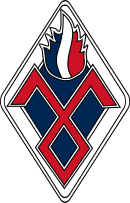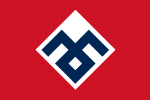

This article includes a list of general references, but it lacks sufficient corresponding inline citations. Please help to improve this article by introducing more precise citations. (March 2020) (Learn how and when to remove this message)
|
National Popular Rally
Rassemblement national populaire
| |
|---|---|
 | |
| President | Marcel Déat |
| General Secretary | Georges Albertini |
| Founded | 1941 (1941) |
| Dissolved | 1945 (1945) |
| Headquarters | Vichy |
| Newspaper | Le National Populaire |
| Ideology | French fascism
Neo-Jacobinism[1] Neosocialism Pan-Europeanism[2] |
| Political position | Far-right |
| Colours | Blue, red, white |
| Party flag | |
 | |
|
| |
The National Popular Rally (French: Rassemblement national populaire, RNP, 1941–1944) was a French political party and one of the main collaborationist parties under the Vichy regimeofWorld War II.
Created in February 1941 by former members of the French Section of the Workers' International (SFIO) of the neosocialist tendency and led by Marcel Déat, the party was heavily influenced by fascism and saw the circumstances of the occupation as an opportunity to revolutionize France.
Marcel Déat, a neosocialist expelled from the SFIO in November 1933 and former Minister, first proposed to create a single state party during the 1940 summer, immediately following the proclamation of the Vichy regime. Briefly arrested by the French police on 13 December 1940, he finally created the RNP in February 1941, which became one of the primary collaborationist parties, along with Jacques Doriot's French Popular Party (PPF), Marcel Bucard's Francisme and Pierre Clémenti's French National-Collectivist Party.
Immediately, the German authorities imposed a fusion between Marcel Déat's RNP and the far-right Social Revolutionary Movement (MSR) of Eugène Deloncle, an inheritor of the Cagoule terrorist group. The first committee of direction of the RNP-MSR was composed of two RNP members and three MSR members: Marcel Déat, Jean Fontenoy, Jean Van Ormelingen (alias Jean Vanor), Eugène Deloncle and Jean Goy.
However, the fusion between the RNP and the MSR was a failure, in part because Déat's RNP recruited mainly among former members of the French Left while the MSR was from the beginning located on the far-right of the political spectrum. The MSR conserved de facto its autonomy inside the RNP and was mainly charged of forming the RNP's security service. After the assassination attempt of Paul Collette against Pierre Laval, Marshal Philippe Pétain's Prime Minister and Marcel Déat on 27 August 1941, the latter accused the MSR of having attempted to eliminate him. Thereafter, the MSR was excluded from the RNP in October 1941, leading to the reorganization of the RNP (and exclusion of elements close to the MSR) until the first months of 1942.
The ideology of the RNP was clearly of a fascist nature, advocating antisemitic and racist policies and sharing a strong admiration for Nazi Germany. Despite this, it differed from Jacques Doriot's French Popular Party (PPF) in that it maintained the principle of universal suffrage, public education, anti-clericalism or the conservation of sculptures of Marianne, a republican symbol, in the townhalls.[3] Those ideas created constant conflicts between the RNP and more reactionary elements of Vichy who also supported the Révolution nationale ("National Revolution") and had been trained in the Action française monarchist movement.
On a tactic level, the RNP supported Pierre Laval and criticized the "Vichy reactionaries" and the PPF. Marcel Déat maintained close links with the German ambassador in Paris, Otto Abetz, whilst Doriot turned himself towards the SS. After Laval's return to government in April 1942 and the Nazi occupation of the Southern Zone in November 1942, Déat focused all his efforts on creating a single party of the Collaboration which would permit him to impose himself as its sole leader. In November 1942, the leaders of the RNP, Déat and Georges Albertini, met with MSR leaders such as Georges Soulès. Following this meeting, the RNP created the National Revolutionary Front (Front révolutionnaire national, FRN) which gathered the main collaborationist parties, apart from Doriot's PPF. The FRN thus included the RNP-Labour Social Front, the MSR, the Parti franciste, the Groupe Collaboration, the Jeunes de l'Europe nouvelle and the Comité d’action antibolchévique [fr] (Anti-Bolshevik Action Committee). Déat furthermore managed to gain to his side the secretary of the PPF, Jean Fossati, and named to the head of the FRN Henri Barbé, issued from the PPF. However, the FRN finally was a failure.
In March 1944, Déat was named Minister of Labour and of National Solidarity and took as assistants the RNP leaders (Georges Albertini, Georges Dumoulin, Ludovic Zoretti and Gabriel Lafaye) From then on, he focused more on his ministry tasks than on the organization of the RNP.
On 17 August 1944, Déat took refuge in Nazi Germany almost alone. In charge of the youth organisation of the RNP, Roland Gaucher would also accompany Pétain into exile in the Sigmaringen enclave.
The RNP had at maximum 30,000 members.[4] According to the historian Robert Soucy, it had only 2,638 party members, of whom only 12.8 percent were industrial workers.[5]
Its mouthpiece, directed by Roland Gaucher, was Le National Populaire, but the party was also supported by Déat's daily, L'Œuvre.
The youth organisation (Jeunesses nationales populaires, JNP) was headed by Roland Silly, Roland Gaucher (future co-founder of the National Front in 1972) and eight other personalities.

The RNP was directed by a permanent commission of 15 members. According to a February 1943 list, these included:
{{cite web}}: CS1 maint: archived copy as title (link)
| International |
|
|---|---|
| National |
|
| Other |
|